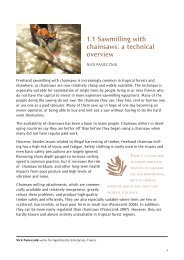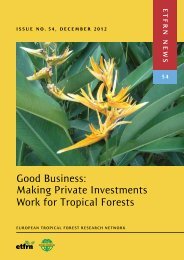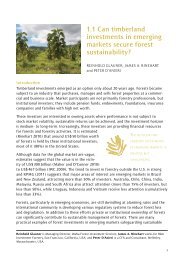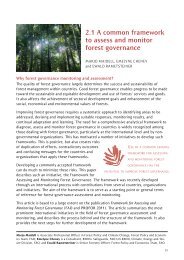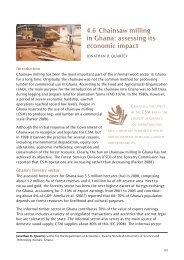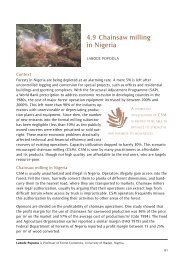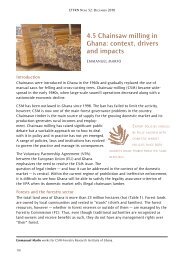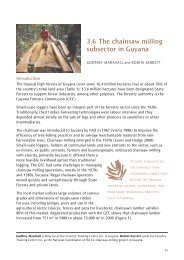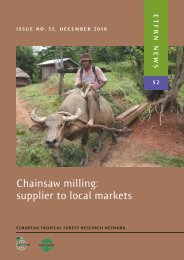Chainsaw milling: supplier to local markets - European Tropical ...
Chainsaw milling: supplier to local markets - European Tropical ...
Chainsaw milling: supplier to local markets - European Tropical ...
Create successful ePaper yourself
Turn your PDF publications into a flip-book with our unique Google optimized e-Paper software.
4.4 csm aND povERTy REDucTioN iN DEmocRaTic REpublic oF coNgo<br />
Access <strong>to</strong> forest resources<br />
The management approach of chainsaw millers in their concessions used <strong>to</strong> follow<br />
cus<strong>to</strong>mary rights (adebu and abdala 2010; pax Christi 2007). These cus<strong>to</strong>mary rights are<br />
still in place; they function parallel <strong>to</strong> the current regula<strong>to</strong>ry framework, which acknowledges<br />
cus<strong>to</strong>mary authority in land management. This leads <strong>to</strong> a situation where land<br />
parcels subject <strong>to</strong> a property agreement, cus<strong>to</strong>mary rights and a cutting licence can exist<br />
side by side. a concession can be obtained through the cus<strong>to</strong>mary authorities or the <strong>local</strong><br />
chief by giving cash (approximately us$1.5 per ha) 3 or in-kind contributions (such as steel<br />
plates, mo<strong>to</strong>rcycles and cattle). after a logger signs an agreement with the <strong>local</strong> leader he<br />
can begin his logging operations and apply for cutting licences from the technical environment<br />
service and the province.<br />
according <strong>to</strong> pax Christi (2007), the concessions for Csm in Eastern province (69,512 ha)<br />
were larger than those from the industry in the area, estimated at 58,000 ha in 2007.<br />
because of the possible lack of information on the part of the communities about the<br />
rights and obligations defined in the new forest law, the village authorities act as the<br />
rights holders without any support (karsenty 2009).<br />
Benefit-sharing mechanisms<br />
karsenty, bertrand and montagne (2006, 451) state clearly that, like poverty, the informal<br />
sec<strong>to</strong>r is the result of the large-scale exclusion of important social groups. Credits are not<br />
available and few <strong>local</strong> loggers have capital. This results in logging operations being prefinanced<br />
by foreign traders and timber being exported <strong>to</strong> neighbouring countries. Csm is<br />
the main <strong>supplier</strong> of <strong>local</strong> sawmills and other social ac<strong>to</strong>rs — such as missionaries, politicians<br />
and public servants — providing products such as sawn timber, beams and boards for<br />
doors and windows. The price per m 3 has declined over the years. in kisangani, the price<br />
for one m 3 is us$250, compared <strong>to</strong> us$350 per m 3 before 1996; in the bas-Congo, the<br />
price is us$150, compared <strong>to</strong> us$200 in 1995.<br />
a variety of stakeholders are found in the sec<strong>to</strong>r: loggers, <strong>local</strong> carpenters, sawmill<br />
owners, mechanics, development partners (nGos, un organizations), transporters and<br />
traders, wholesalers and retailers. Csm provides jobs and services in both rural and urban<br />
areas and makes an important social and economic impact by reducing poverty among<br />
rural populations. but who benefits most? neither the <strong>local</strong> and indigenous population<br />
hired as cheap labour nor the administration offices without fiscal recipes. but according<br />
<strong>to</strong> lescuyer, Eba’a atyi and Cerutti (2009) informal logging is very profitable in economic<br />
terms. it does not benefit the national economy, however; informal and formal fees profit<br />
only private individuals.<br />
145



